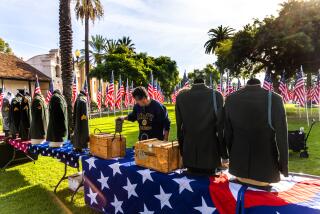Unit Ready, Willing and Extremely Able
- Share via
Once a month, 160 men and women throughout Ventura County have set aside their briefcases and business suits, slipped into Marine uniforms and prepared for a war they hoped would never come.
But as events around the world unfold, members of the county’s Marine reserve unit, based in Port Hueneme, are keenly aware that they may be put into action for the first time since the Desert Shield/Desert Storm battle in Kuwait 10 years ago.
If the unit does ship out, however, there is no question it will be ready.
Today at the annual Marines Ball, the reservists will be honored with the Gen. Melvin J. Maas Award, given to the top reserve unit in the nation. It is the first time the 2nd Battalion, 23rd Marine Unit, has received the honor in its 48-year history.
The award is based on field exercises, shooting and athletic competitions and overall attendance at monthly training events. But it also shows that the reservists were dedicated to training on their own time.
“This says this unit does what it does better than anybody else in the Marine Corps Reserves,” said reservist Steve Scarf, a Ventura FBI agent who holds the rank of major. “And that says a lot because these guys are only required to do this once a month. They have lives, other jobs. But to put in this amount of work shows a huge level of determination, hard work and sacrifice.”
Added Jennifer Stambaugh, who is married to the unit’s commanding officer, “We can feel much more at ease knowing they are the most prepared unit in the entire Marine Corps. They worked really hard to accomplish that. And it’s just as important that we are as prepared so we can be supportive and continue our roles and responsibilities here while they’re away.”
Officially, the Marines have not been told they are going to deploy any time soon.
However, they and their spouses are getting ready.
Before receiving today’s honor, the unit will hold an afternoon briefing to let spouses know what they can expect if the unit is sent off.
“The families will suffer a lot of emotional distress and concern; some will face financial difficulties,” said Stambaugh, coordinator of the Key Volunteer Network. The group is available to answer questions and serve as a liaison between those at home and those in service.
“We need to prepare the families . . . in the event that our Marines are deployed,” she said, “which is a fairly strong possibility.”
Among the lessons reserve coordinators learned from their deployment in the fight against Saddam Hussein was the need to improve communication with those left behind. Unlike the wives and husbands of full-time service personnel, reserve spouses weren’t accustomed to military deployments that can last for weeks or months.
“So we had wives calling, parents, wanting to know what this means, what that means,” said Maj. Francis Grzymkowski, who oversees the unit. “And it pointed out obviously that this is something we need to do for our Marines and their families.”
Some spouses not used to assuming the head of household role could be thrust into a position of paying bills and handling repairs, day care and health care issues.
Some may even see a cut in income, as reservists switch from civilian employment to being full-time service members receiving Marine Corps pay. But there are programs available to help, including the Navy Relief Society, the Family Service Center and the American Red Cross.
The unit periodically tries to get such information out to spouses, even in peacetime. But usually pamphlets are handed out or information booths set up during summer picnics and festivals.
Because of the Sept. 11 terrorist attacks and the U.S. government’s retaliation efforts in Afghanistan, Marine officials felt it was important to put a larger emphasis on the briefing.
More to Read
Sign up for Essential California
The most important California stories and recommendations in your inbox every morning.
You may occasionally receive promotional content from the Los Angeles Times.













